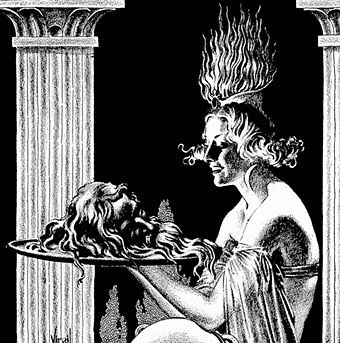While chasing down Virgil Finlay’s illustration for Lovecraft’s The Colour Out of Space earlier this week I came across another Finlay drawing I’d not noticed before in a book I’ve owned for years. Makes me wonder what else is lurking on the shelves. Finlay’s depiction of Salomé was an illustration for Waxworks, a story by Robert Bloch published in Weird Tales for January 1939. I’ve never read much of Bloch’s fiction, this story included, so can’t say anything about it, but Finlay’s drawing impresses for the solid black night sky, and the peculiar flaming headdress, the kind of unique detail he often added to his pictures.
Bloch and Finlay had a memorable encounter a couple of years years before when Finlay illustrated The Faceless God, another Weird Tales piece which so impressed HP Lovecraft that it inspired a poem, To Mr. Finlay, Upon His Drawing for Mr. Bloch’s Tale, ‘The Faceless God’. Lovecraft’s handwritten draft can be seen (but not necessarily read) here.
Elsewhere on { feuilleton }
• The Salomé archive


Strangely enough I can just about read the handwriting. My own handwriting is so bad that I’m used to reading atrocious writing of other people. Thank Cthulhu for typewriters eh?
For example the postscript reads
“Well well – quite in the Yuggoth tradition! I’ll have to keep a copy of this to try on one or another of the fan magazines”
Lovecraft shunned typewriters as horrible modern things fit only for office workers and vulgar journalists.
“Yuggoth tradition” probably refers to Fungi from Yuggoth, his sonnet cycle.
“I could easily scrawl a sonnet to one of your masterpieces if you weren’t too particular about quality. For example —”
So what lucky person(s) got to decipher his handwriting when they were first being published?
PS. How many major artists did JHWilliams III emulate during his run on Promethea. Just the covers alone:
http://kleinletters.com/PrometheaCovers.html
The hand writing is not SO dismal. I love the poem (and the picture of Salomé). Thanks for the treats.
I forget offhand who typed Lovecraft’s work, would have to check the biography. He was often resolutely unprofessional. He regarded writing as an amateur art for “gentlemen” so he’d often send handwritten manuscripts to magazines then shrug when they were rejected.